An Analysis of Different Roles in the Construction Industry
VerifiedAdded on 2022/10/15
|6
|1385
|13
Report
AI Summary
This report provides an overview of four key roles within the construction industry: site manager, certifier, structural engineer, and project manager. The site manager oversees daily site operations, ensuring adherence to building codes, health and safety regulations, and project schedules and budgets. The certifier issues development certificates, ensuring projects meet legislative standards and inspecting construction projects at critical stages. Structural or civil engineers design and construct buildings and structures, preparing reports and calculations related to structural integrity. The project manager is responsible for the successful development, implementation, monitoring, and closure of construction projects, requiring a diverse skill set to meet deadlines and manage client relationships. Each role's responsibilities and contributions are detailed, along with references to relevant literature.
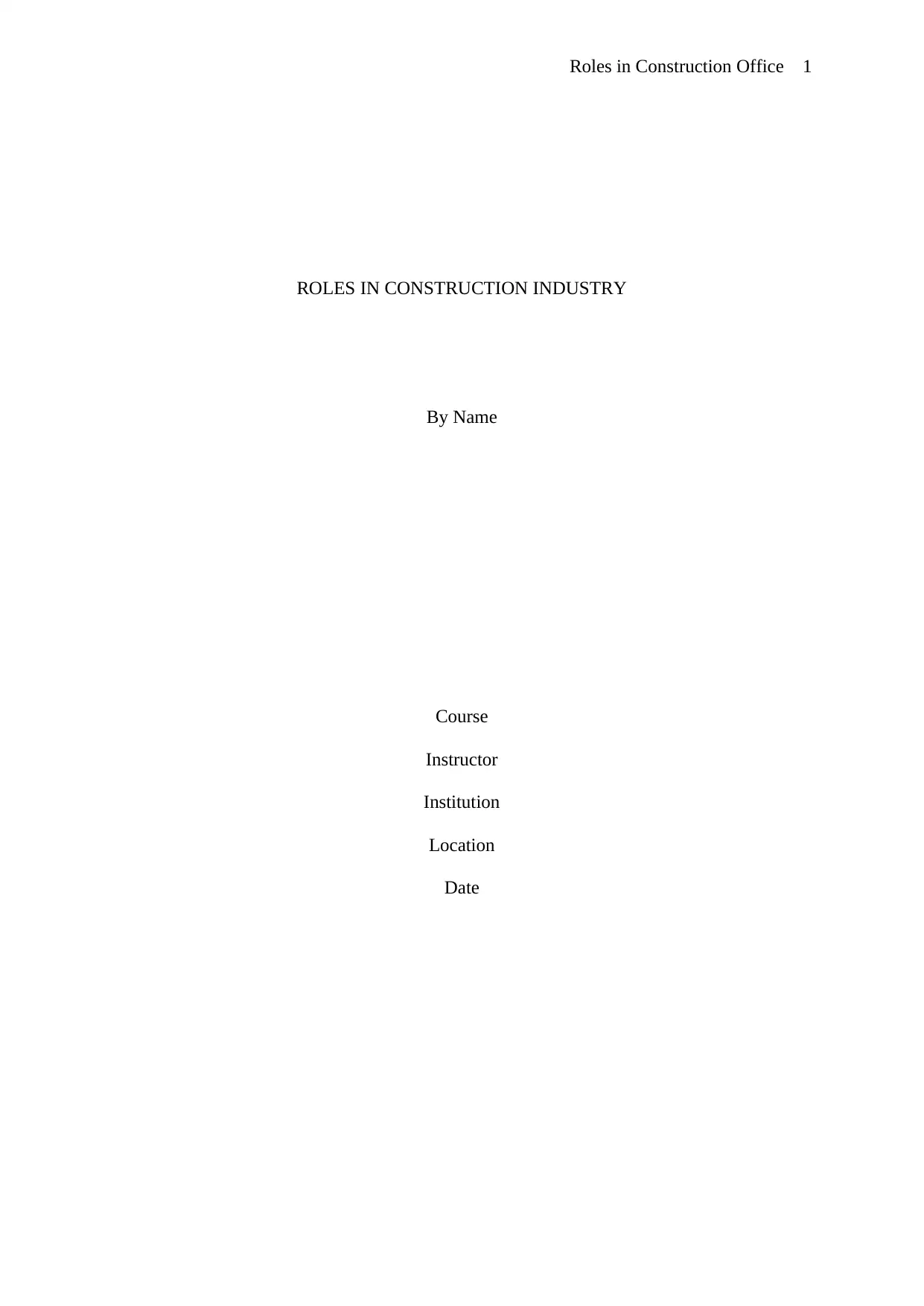
Roles in Construction Office 1
ROLES IN CONSTRUCTION INDUSTRY
By Name
Course
Instructor
Institution
Location
Date
ROLES IN CONSTRUCTION INDUSTRY
By Name
Course
Instructor
Institution
Location
Date
Paraphrase This Document
Need a fresh take? Get an instant paraphrase of this document with our AI Paraphraser
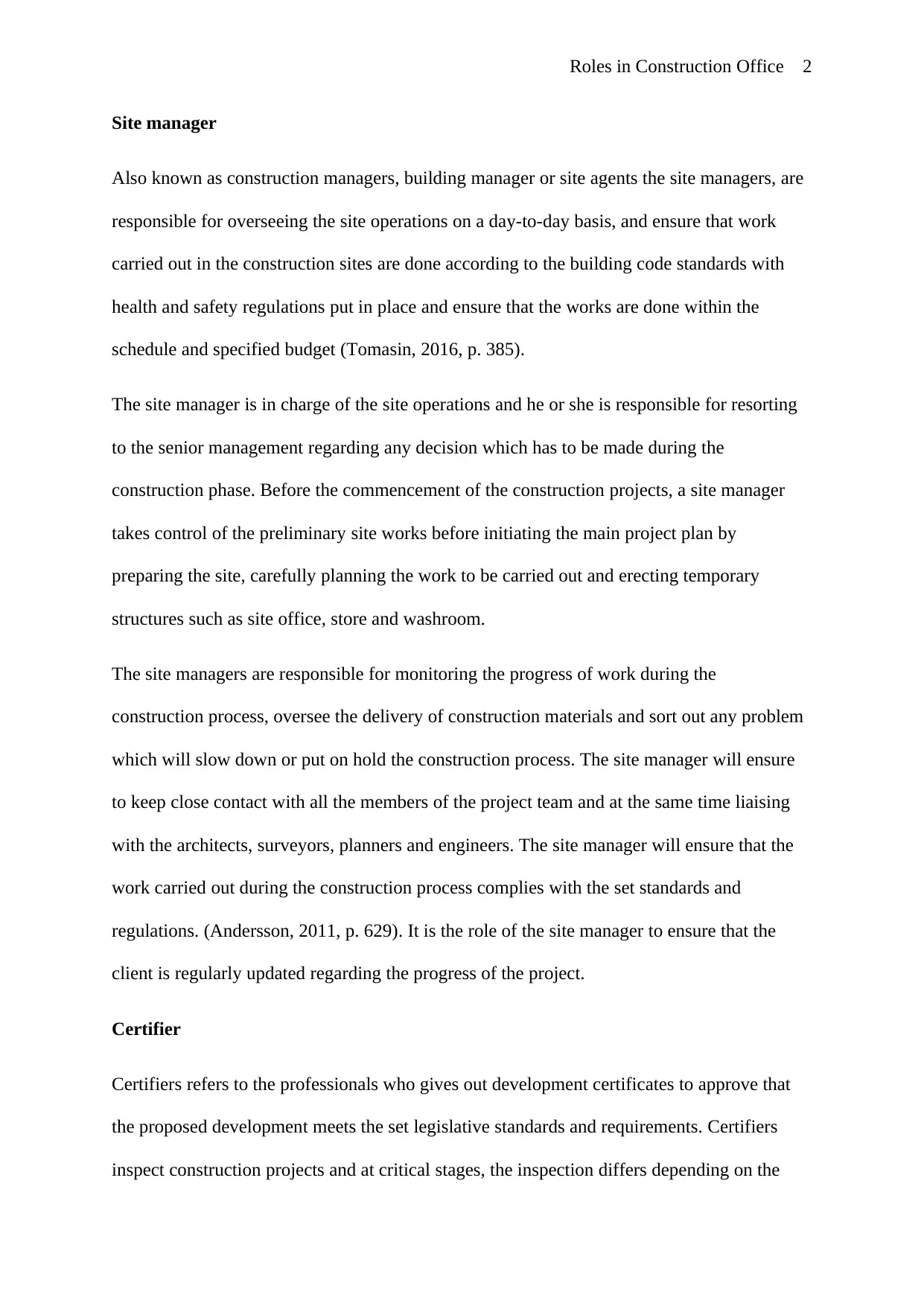
Roles in Construction Office 2
Site manager
Also known as construction managers, building manager or site agents the site managers, are
responsible for overseeing the site operations on a day-to-day basis, and ensure that work
carried out in the construction sites are done according to the building code standards with
health and safety regulations put in place and ensure that the works are done within the
schedule and specified budget (Tomasin, 2016, p. 385).
The site manager is in charge of the site operations and he or she is responsible for resorting
to the senior management regarding any decision which has to be made during the
construction phase. Before the commencement of the construction projects, a site manager
takes control of the preliminary site works before initiating the main project plan by
preparing the site, carefully planning the work to be carried out and erecting temporary
structures such as site office, store and washroom.
The site managers are responsible for monitoring the progress of work during the
construction process, oversee the delivery of construction materials and sort out any problem
which will slow down or put on hold the construction process. The site manager will ensure
to keep close contact with all the members of the project team and at the same time liaising
with the architects, surveyors, planners and engineers. The site manager will ensure that the
work carried out during the construction process complies with the set standards and
regulations. (Andersson, 2011, p. 629). It is the role of the site manager to ensure that the
client is regularly updated regarding the progress of the project.
Certifier
Certifiers refers to the professionals who gives out development certificates to approve that
the proposed development meets the set legislative standards and requirements. Certifiers
inspect construction projects and at critical stages, the inspection differs depending on the
Site manager
Also known as construction managers, building manager or site agents the site managers, are
responsible for overseeing the site operations on a day-to-day basis, and ensure that work
carried out in the construction sites are done according to the building code standards with
health and safety regulations put in place and ensure that the works are done within the
schedule and specified budget (Tomasin, 2016, p. 385).
The site manager is in charge of the site operations and he or she is responsible for resorting
to the senior management regarding any decision which has to be made during the
construction phase. Before the commencement of the construction projects, a site manager
takes control of the preliminary site works before initiating the main project plan by
preparing the site, carefully planning the work to be carried out and erecting temporary
structures such as site office, store and washroom.
The site managers are responsible for monitoring the progress of work during the
construction process, oversee the delivery of construction materials and sort out any problem
which will slow down or put on hold the construction process. The site manager will ensure
to keep close contact with all the members of the project team and at the same time liaising
with the architects, surveyors, planners and engineers. The site manager will ensure that the
work carried out during the construction process complies with the set standards and
regulations. (Andersson, 2011, p. 629). It is the role of the site manager to ensure that the
client is regularly updated regarding the progress of the project.
Certifier
Certifiers refers to the professionals who gives out development certificates to approve that
the proposed development meets the set legislative standards and requirements. Certifiers
inspect construction projects and at critical stages, the inspection differs depending on the
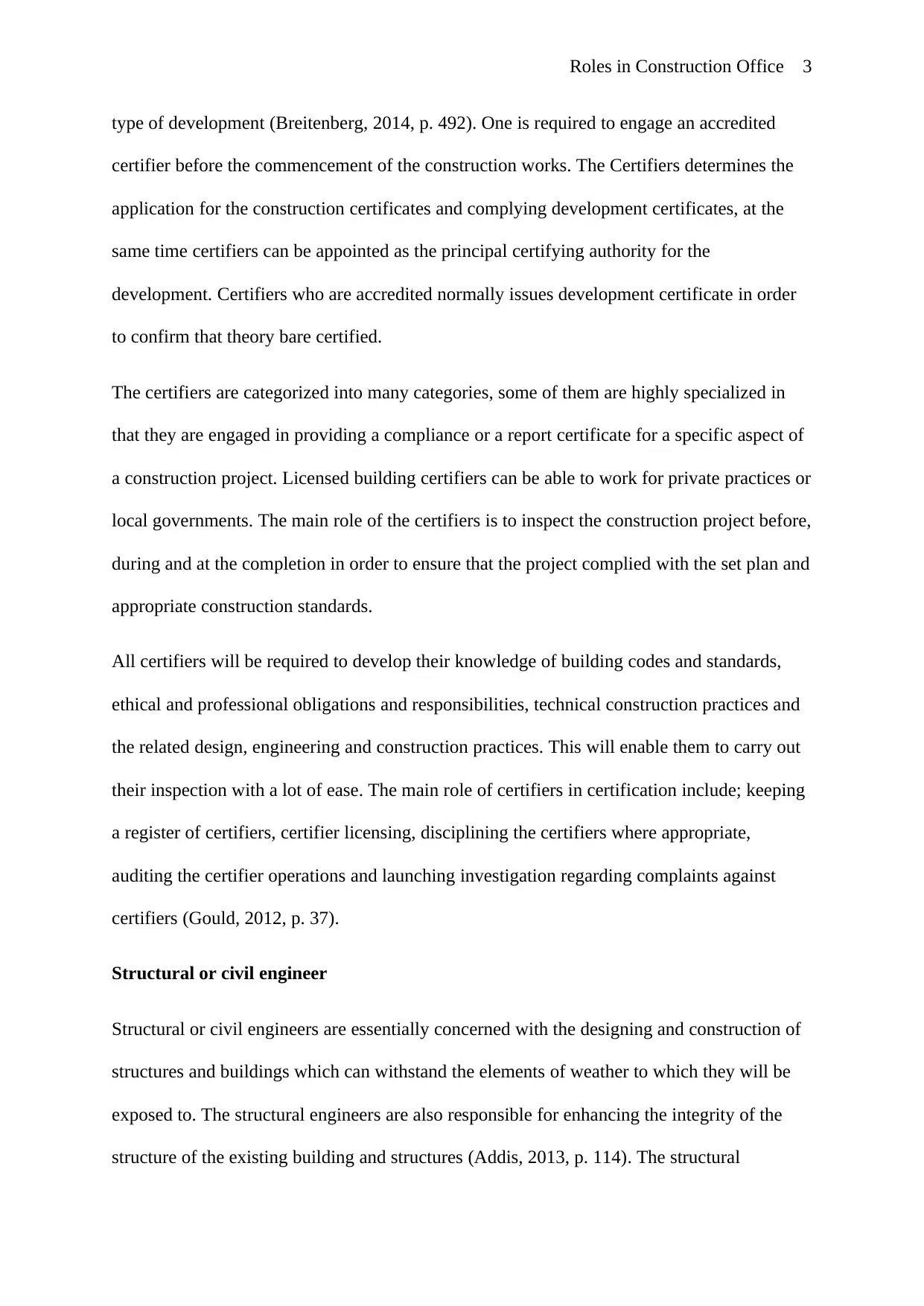
Roles in Construction Office 3
type of development (Breitenberg, 2014, p. 492). One is required to engage an accredited
certifier before the commencement of the construction works. The Certifiers determines the
application for the construction certificates and complying development certificates, at the
same time certifiers can be appointed as the principal certifying authority for the
development. Certifiers who are accredited normally issues development certificate in order
to confirm that theory bare certified.
The certifiers are categorized into many categories, some of them are highly specialized in
that they are engaged in providing a compliance or a report certificate for a specific aspect of
a construction project. Licensed building certifiers can be able to work for private practices or
local governments. The main role of the certifiers is to inspect the construction project before,
during and at the completion in order to ensure that the project complied with the set plan and
appropriate construction standards.
All certifiers will be required to develop their knowledge of building codes and standards,
ethical and professional obligations and responsibilities, technical construction practices and
the related design, engineering and construction practices. This will enable them to carry out
their inspection with a lot of ease. The main role of certifiers in certification include; keeping
a register of certifiers, certifier licensing, disciplining the certifiers where appropriate,
auditing the certifier operations and launching investigation regarding complaints against
certifiers (Gould, 2012, p. 37).
Structural or civil engineer
Structural or civil engineers are essentially concerned with the designing and construction of
structures and buildings which can withstand the elements of weather to which they will be
exposed to. The structural engineers are also responsible for enhancing the integrity of the
structure of the existing building and structures (Addis, 2013, p. 114). The structural
type of development (Breitenberg, 2014, p. 492). One is required to engage an accredited
certifier before the commencement of the construction works. The Certifiers determines the
application for the construction certificates and complying development certificates, at the
same time certifiers can be appointed as the principal certifying authority for the
development. Certifiers who are accredited normally issues development certificate in order
to confirm that theory bare certified.
The certifiers are categorized into many categories, some of them are highly specialized in
that they are engaged in providing a compliance or a report certificate for a specific aspect of
a construction project. Licensed building certifiers can be able to work for private practices or
local governments. The main role of the certifiers is to inspect the construction project before,
during and at the completion in order to ensure that the project complied with the set plan and
appropriate construction standards.
All certifiers will be required to develop their knowledge of building codes and standards,
ethical and professional obligations and responsibilities, technical construction practices and
the related design, engineering and construction practices. This will enable them to carry out
their inspection with a lot of ease. The main role of certifiers in certification include; keeping
a register of certifiers, certifier licensing, disciplining the certifiers where appropriate,
auditing the certifier operations and launching investigation regarding complaints against
certifiers (Gould, 2012, p. 37).
Structural or civil engineer
Structural or civil engineers are essentially concerned with the designing and construction of
structures and buildings which can withstand the elements of weather to which they will be
exposed to. The structural engineers are also responsible for enhancing the integrity of the
structure of the existing building and structures (Addis, 2013, p. 114). The structural
⊘ This is a preview!⊘
Do you want full access?
Subscribe today to unlock all pages.

Trusted by 1+ million students worldwide
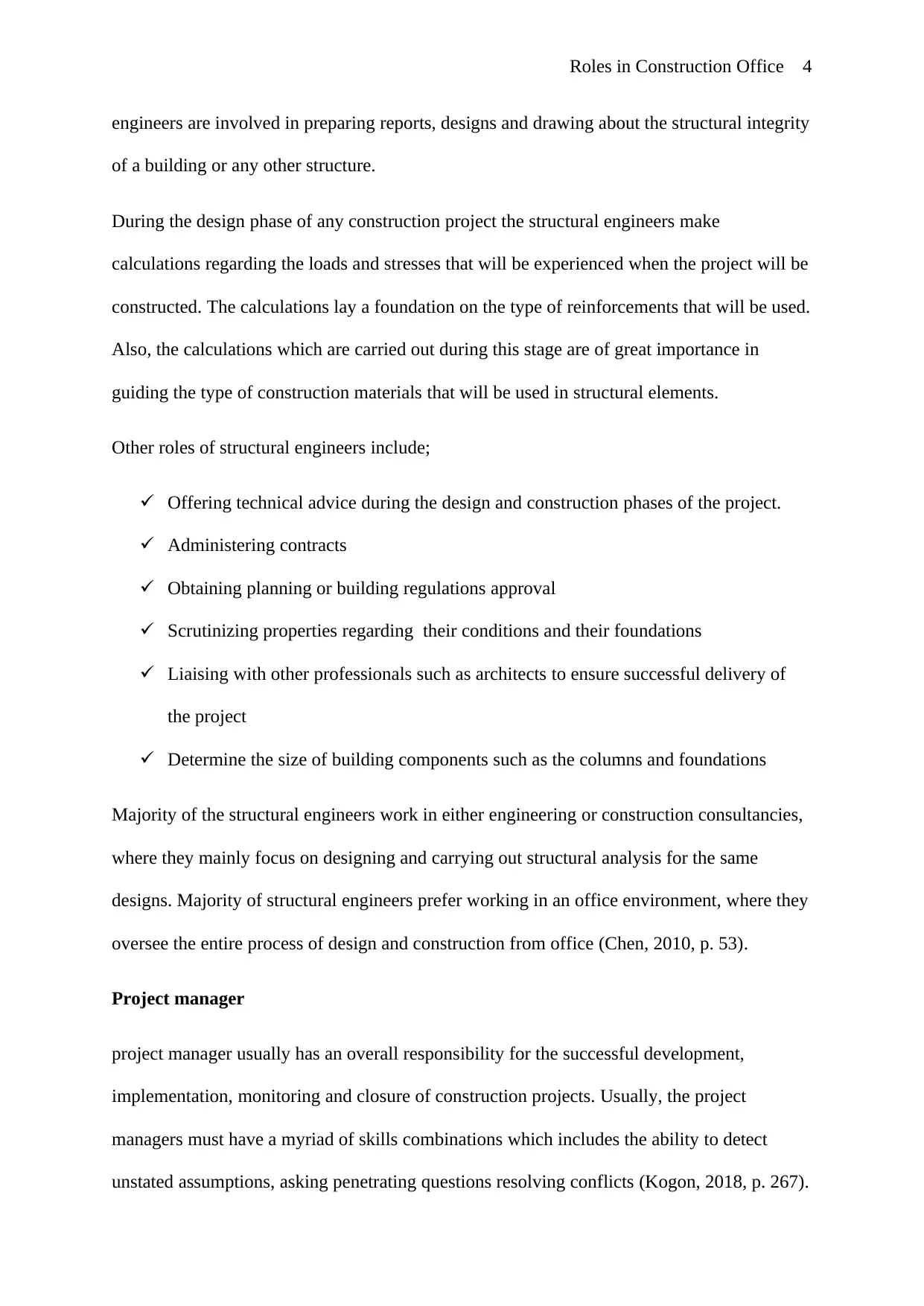
Roles in Construction Office 4
engineers are involved in preparing reports, designs and drawing about the structural integrity
of a building or any other structure.
During the design phase of any construction project the structural engineers make
calculations regarding the loads and stresses that will be experienced when the project will be
constructed. The calculations lay a foundation on the type of reinforcements that will be used.
Also, the calculations which are carried out during this stage are of great importance in
guiding the type of construction materials that will be used in structural elements.
Other roles of structural engineers include;
Offering technical advice during the design and construction phases of the project.
Administering contracts
Obtaining planning or building regulations approval
Scrutinizing properties regarding their conditions and their foundations
Liaising with other professionals such as architects to ensure successful delivery of
the project
Determine the size of building components such as the columns and foundations
Majority of the structural engineers work in either engineering or construction consultancies,
where they mainly focus on designing and carrying out structural analysis for the same
designs. Majority of structural engineers prefer working in an office environment, where they
oversee the entire process of design and construction from office (Chen, 2010, p. 53).
Project manager
project manager usually has an overall responsibility for the successful development,
implementation, monitoring and closure of construction projects. Usually, the project
managers must have a myriad of skills combinations which includes the ability to detect
unstated assumptions, asking penetrating questions resolving conflicts (Kogon, 2018, p. 267).
engineers are involved in preparing reports, designs and drawing about the structural integrity
of a building or any other structure.
During the design phase of any construction project the structural engineers make
calculations regarding the loads and stresses that will be experienced when the project will be
constructed. The calculations lay a foundation on the type of reinforcements that will be used.
Also, the calculations which are carried out during this stage are of great importance in
guiding the type of construction materials that will be used in structural elements.
Other roles of structural engineers include;
Offering technical advice during the design and construction phases of the project.
Administering contracts
Obtaining planning or building regulations approval
Scrutinizing properties regarding their conditions and their foundations
Liaising with other professionals such as architects to ensure successful delivery of
the project
Determine the size of building components such as the columns and foundations
Majority of the structural engineers work in either engineering or construction consultancies,
where they mainly focus on designing and carrying out structural analysis for the same
designs. Majority of structural engineers prefer working in an office environment, where they
oversee the entire process of design and construction from office (Chen, 2010, p. 53).
Project manager
project manager usually has an overall responsibility for the successful development,
implementation, monitoring and closure of construction projects. Usually, the project
managers must have a myriad of skills combinations which includes the ability to detect
unstated assumptions, asking penetrating questions resolving conflicts (Kogon, 2018, p. 267).
Paraphrase This Document
Need a fresh take? Get an instant paraphrase of this document with our AI Paraphraser
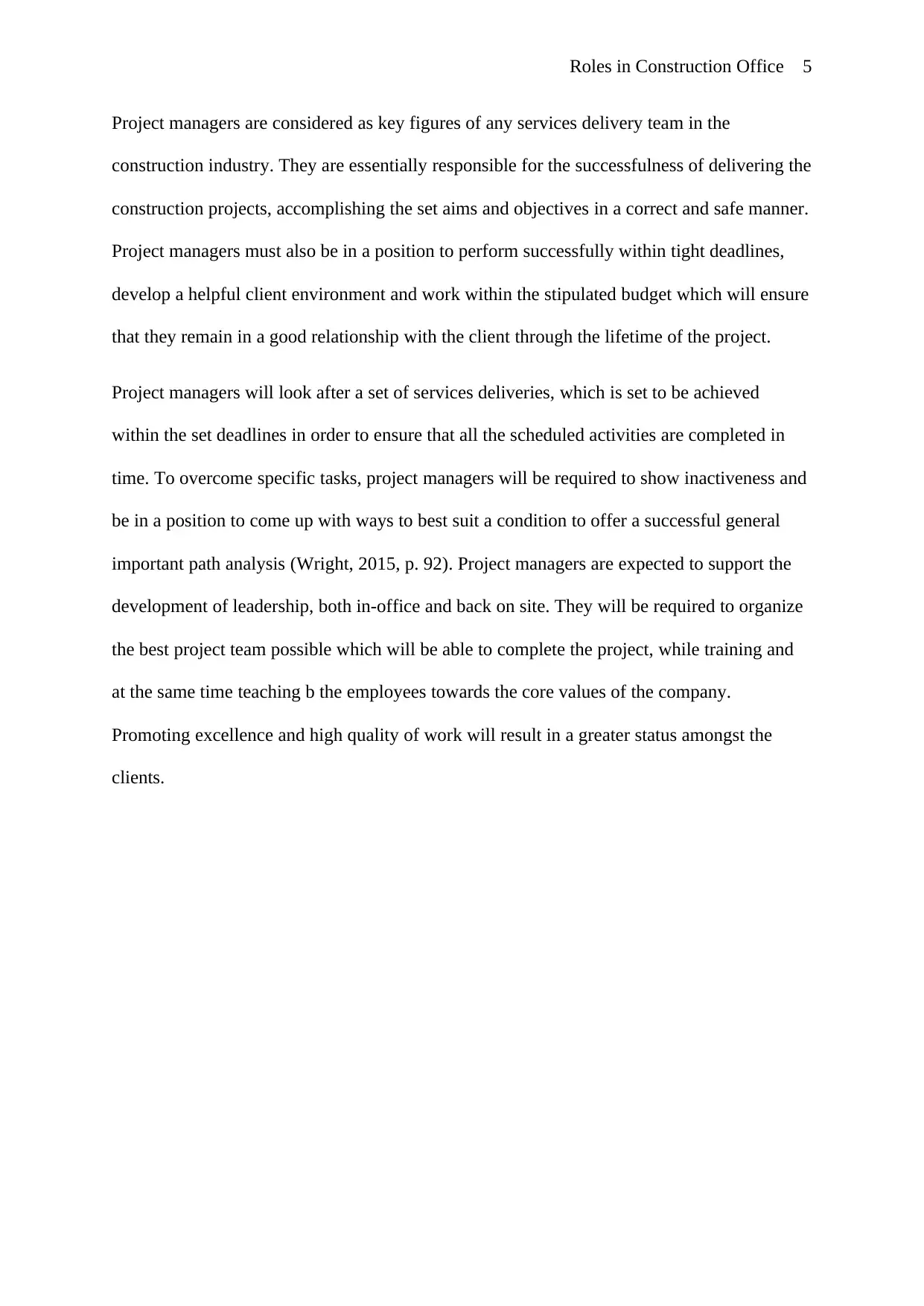
Roles in Construction Office 5
Project managers are considered as key figures of any services delivery team in the
construction industry. They are essentially responsible for the successfulness of delivering the
construction projects, accomplishing the set aims and objectives in a correct and safe manner.
Project managers must also be in a position to perform successfully within tight deadlines,
develop a helpful client environment and work within the stipulated budget which will ensure
that they remain in a good relationship with the client through the lifetime of the project.
Project managers will look after a set of services deliveries, which is set to be achieved
within the set deadlines in order to ensure that all the scheduled activities are completed in
time. To overcome specific tasks, project managers will be required to show inactiveness and
be in a position to come up with ways to best suit a condition to offer a successful general
important path analysis (Wright, 2015, p. 92). Project managers are expected to support the
development of leadership, both in-office and back on site. They will be required to organize
the best project team possible which will be able to complete the project, while training and
at the same time teaching b the employees towards the core values of the company.
Promoting excellence and high quality of work will result in a greater status amongst the
clients.
Project managers are considered as key figures of any services delivery team in the
construction industry. They are essentially responsible for the successfulness of delivering the
construction projects, accomplishing the set aims and objectives in a correct and safe manner.
Project managers must also be in a position to perform successfully within tight deadlines,
develop a helpful client environment and work within the stipulated budget which will ensure
that they remain in a good relationship with the client through the lifetime of the project.
Project managers will look after a set of services deliveries, which is set to be achieved
within the set deadlines in order to ensure that all the scheduled activities are completed in
time. To overcome specific tasks, project managers will be required to show inactiveness and
be in a position to come up with ways to best suit a condition to offer a successful general
important path analysis (Wright, 2015, p. 92). Project managers are expected to support the
development of leadership, both in-office and back on site. They will be required to organize
the best project team possible which will be able to complete the project, while training and
at the same time teaching b the employees towards the core values of the company.
Promoting excellence and high quality of work will result in a greater status amongst the
clients.
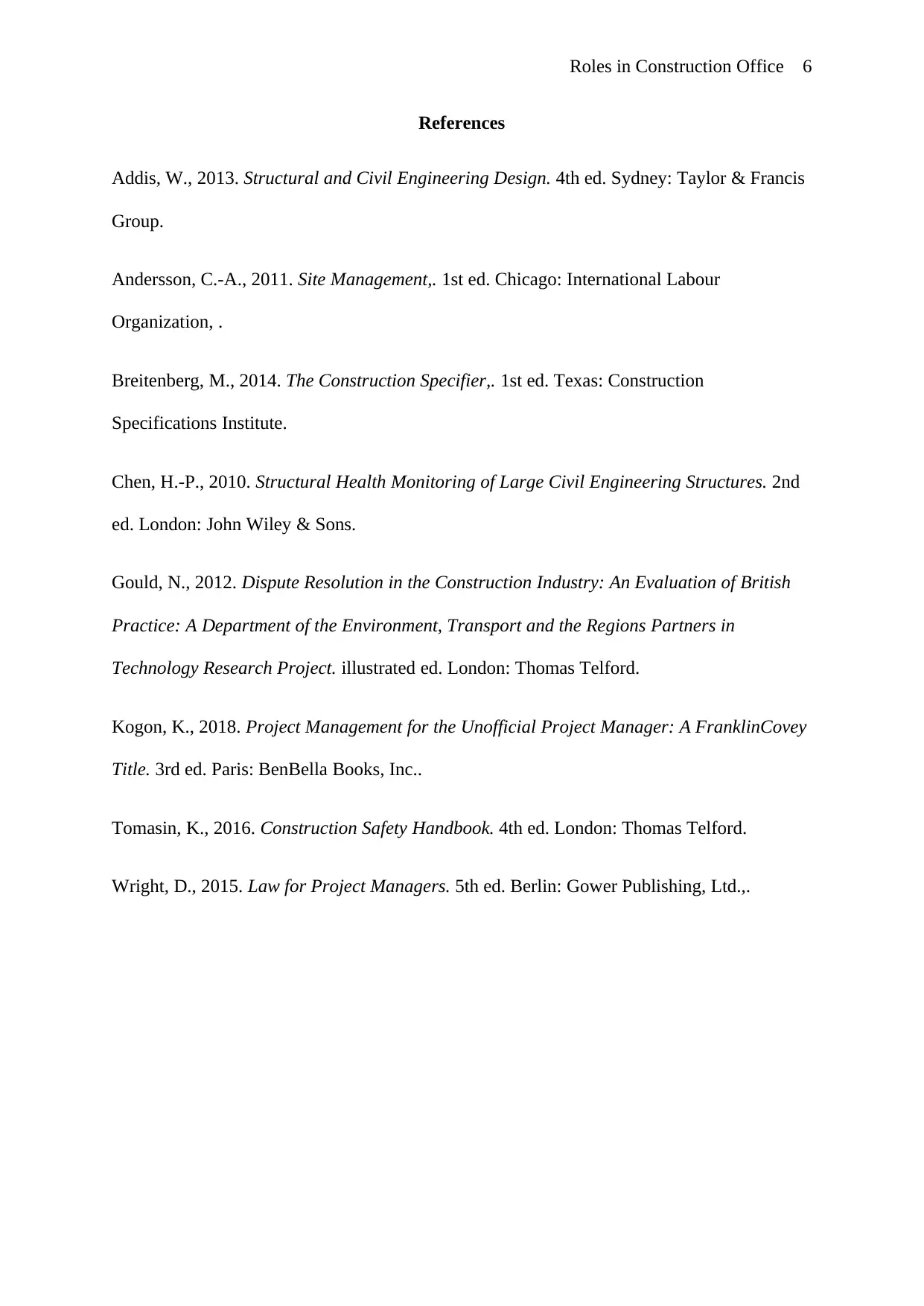
Roles in Construction Office 6
References
Addis, W., 2013. Structural and Civil Engineering Design. 4th ed. Sydney: Taylor & Francis
Group.
Andersson, C.-A., 2011. Site Management,. 1st ed. Chicago: International Labour
Organization, .
Breitenberg, M., 2014. The Construction Specifier,. 1st ed. Texas: Construction
Specifications Institute.
Chen, H.-P., 2010. Structural Health Monitoring of Large Civil Engineering Structures. 2nd
ed. London: John Wiley & Sons.
Gould, N., 2012. Dispute Resolution in the Construction Industry: An Evaluation of British
Practice: A Department of the Environment, Transport and the Regions Partners in
Technology Research Project. illustrated ed. London: Thomas Telford.
Kogon, K., 2018. Project Management for the Unofficial Project Manager: A FranklinCovey
Title. 3rd ed. Paris: BenBella Books, Inc..
Tomasin, K., 2016. Construction Safety Handbook. 4th ed. London: Thomas Telford.
Wright, D., 2015. Law for Project Managers. 5th ed. Berlin: Gower Publishing, Ltd.,.
References
Addis, W., 2013. Structural and Civil Engineering Design. 4th ed. Sydney: Taylor & Francis
Group.
Andersson, C.-A., 2011. Site Management,. 1st ed. Chicago: International Labour
Organization, .
Breitenberg, M., 2014. The Construction Specifier,. 1st ed. Texas: Construction
Specifications Institute.
Chen, H.-P., 2010. Structural Health Monitoring of Large Civil Engineering Structures. 2nd
ed. London: John Wiley & Sons.
Gould, N., 2012. Dispute Resolution in the Construction Industry: An Evaluation of British
Practice: A Department of the Environment, Transport and the Regions Partners in
Technology Research Project. illustrated ed. London: Thomas Telford.
Kogon, K., 2018. Project Management for the Unofficial Project Manager: A FranklinCovey
Title. 3rd ed. Paris: BenBella Books, Inc..
Tomasin, K., 2016. Construction Safety Handbook. 4th ed. London: Thomas Telford.
Wright, D., 2015. Law for Project Managers. 5th ed. Berlin: Gower Publishing, Ltd.,.
⊘ This is a preview!⊘
Do you want full access?
Subscribe today to unlock all pages.

Trusted by 1+ million students worldwide
1 out of 6
Related Documents
Your All-in-One AI-Powered Toolkit for Academic Success.
+13062052269
info@desklib.com
Available 24*7 on WhatsApp / Email
![[object Object]](/_next/static/media/star-bottom.7253800d.svg)
Unlock your academic potential
Copyright © 2020–2026 A2Z Services. All Rights Reserved. Developed and managed by ZUCOL.





